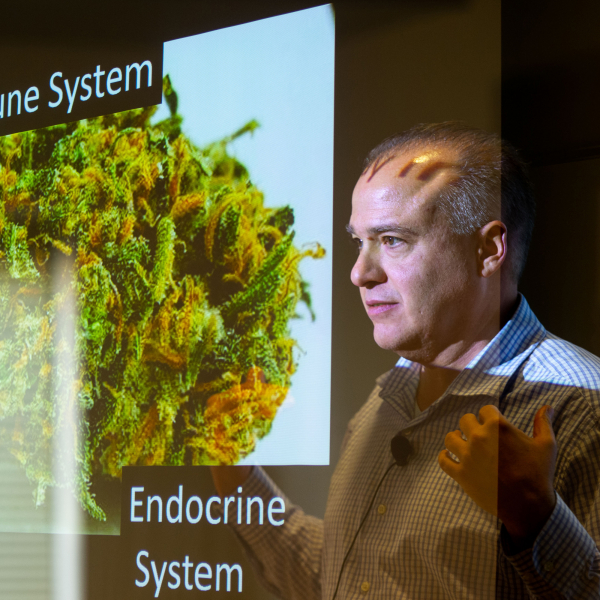What Does It Take to Move a U-M Course Online? A Little Foresight, Communication, and Teamwork

When University of Michigan President Mark Schlissel announced the decision to move all courses online for the remainder of the Winter 2020 semester, U-M faculty, staff, and graduate students had a few short days to make substantial changes to the delivery of a world-class education.
“I found the transition exhilarating,” says Gus Rosania, PhD, Professor of Pharmaceutical Sciences. “I’d begun researching online education and virtual reality (VR) in 2007 and incorporated remote education in my courses and within my research group over a decade ago.”
“Prior to President Schlissel’s announcement, I had begun preparations for a large-scale move to remote education with the assistance of the College’s IT department,” recalls Dr. Rosania. “I had a pretty good sense of how things were going to go and everything I had to do to be prepared. Successfully migrating my courses was very rewarding – there is no greater experience than witnessing one’s vision of the future become a reality.”
“We are using a variety of different resources to teach remotely,” explains Brian VanDerziel, MS, Senior Academic Technology Specialist at the College of Pharmacy. “Our courses are very unique and there is not a one size fits all remote strategy that works for every course so we had to look at each course individually.”
“There were lots of discussions around synchronous and asynchronous teaching,” Brian adds. “We decided that a combination of both would work best. To make this possible we utilized tools such as BlueJeans, Zoom, Canvas Conference, and Kaltura capture. The idea was that any teaching that was happening live would also be recorded to be viewed by students that were unable to make the live sessions.”
“The feedback we have received thus far has been very positive and even better than expected from both faculty and staff,” notes Brian. “We had a very short time to make this all happen and while there were some bumps in the road and we were navigating these unprecedented times we were very happy in what we were able to do.”
While the transition to remote education was generally successful, the situation was necessitated by a national emergency.
“The sadness and tragedy of people getting sick and dying and everything that is associated with COVID-19 and the present status of our healthcare system is very painful and frustrating to me,” says Dr. Rosania. “I wish things did not have to be as traumatic as they are right now. Keep in mind that compassion is the pillar upon which Medicine is built, I hope I can bring that understanding into my courses and research.”
Changing the typical U-M Pharmacy student experience
“A normal day in PharmSci 420 has changed a great deal since the pandemic forced classes online,” says Mery Vet George De la Rosa, 3rd-year Pharmaceutical Sciences graduate student and course graduate student instructor. “With the move online, there was a lot of emailing back and forward with the professors, rearranging the course schedule, communicating with the students as to what is going on and keeping guest lecturers in the loop.”
“With the live online lectures, it was interesting to see how many students would actually log in, it’s harder for me to gage engagement and try to keep individual students engaged,” continues Mery Vet. “But one thing that really surprised me was the fact that with online lectures, students seemed more likely to ask questions, either by unmuting themselves or using the chat. I remembered that in class every time the guest lecturers asked ‘Any questions?’ there was always complete silence, now the chat blew up with questions that I would read to the lecturer sort of like a Q&A session.”
“We had to consider things we’ve never had before, like time zones,” says Mery Vet. “I now had students on the other side of the world who I was not going to make log in to live courses because it was a very inconvenient time, so we had to make sure professors recorded the lectures and post them. Taking exams for these students also required coordinating alternative times.”
Students found the transition generally positive, in particular the recorded lectures and flexibility.
One student noted, “The recordings and extended deadlines were very helpful. With time zone differences, this allowed everyone to be able to complete the assignments on time.” Another student remarked, “Remote learning is great! I think we should keep it after the COVID craze.” Many students liked that they could go back and review lectures or save their favorites for later viewing.
However, several of the students in the course mention the stress of the current public health crisis and how that negatively impacted their engagement with course material. “For me, personal motivation and managing life stresses were the greatest challenges,” said a student. “I had friends and families who were affected by COVID–19 and this led to increased stresses in my own life.”
Where do we go from here?
While the University remains cautiously optimistic about the feasibility of in person classes in the Fall 2020 semester, the College is preparing for many possible scenarios. Whether in person, remote, or a combination of the two, U-M Pharmacy is ready to deliver a high-quality educational experience. Ultimately, Dr. Rosania sees some integration of VR in learning in the University’s future.
“Virtual reality is unavoidably the future of digital technology, communication, and education,” states Dr. Rosania. “A VR classroom can be hugely successful for universities, as it would offer the sophisticated, immersive educational experience and it could make it accessible to all students in what could be a very flexible, adaptable, and individualizable manner.”



